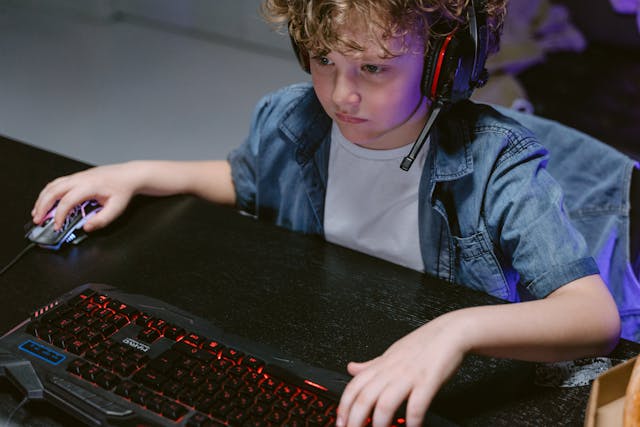
The internet has become an undeniable part of modern life, and for children, it’s a vast playground filled with opportunities for learning, connection, and creativity. From educational apps to interactive games, the digital world offers a treasure trove of experiences that can supplement traditional learning and ignite a child’s curiosity. However, as with any playground, there are potential hazards lurking alongside the swings and slides. The challenge for parents lies in striking a healthy balance, ensuring children reap the benefits of online engagement while mitigating the risks of excessive screen time or exposure to inappropriate content. The online world is an extension of our physical environment and just like any playground, responsible supervision and a healthy dose of caution are essential for a safe and enriching experience.
Lee Hawker-Lecesne MBPsS, Clinical Director at The Cabin, Asia’s premier rehabilitation center, comments: “The online world presents a wealth of educational resources, but it’s crucial to remember it’s not a replacement for traditional classroom learning and social interaction.”
Advantages of Kids Online
- One of the most significant advantages of online time for children is access to a vast library of educational resources. Interactive learning platforms and educational games can make the process of acquiring knowledge engaging and fun.
- Children can explore topics beyond the confines of a textbook, delve into subjects that pique their interest, and learn at their own pace. Educational apps can personalize the learning experience, catering to individual learning styles and addressing specific needs.
- The online world fosters a global community, allowing children to connect with peers who share their interests regardless of geographical boundaries. Social media platforms can facilitate communication with family and friends who live far away, combating feelings of isolation and fostering a sense of belonging. Online communities built around specific hobbies or interests can offer valuable peer-to-peer learning and create a space for children to find their tribe.
When online gaming becomes problematic
The immersive nature of online gaming can become problematic when it crosses the line into addiction. Games are often meticulously crafted to be captivating, employing reward systems, social interaction, and a sense of constant progress to keep players engaged for extended periods. While moderate gaming can offer some cognitive benefits, such as improved hand-eye coordination and problem-solving skills, excessive gaming can have detrimental effects.
Lee states: “Children who spend a significant amount of time glued to screens may experience sleep disturbances, neglecting essential activities like physical exercise and social interaction, leading to social isolation and a decline in academic performance. The concern surrounding online gaming intensifies when it comes to exposure to age-inappropriate content. While parental controls and content filtering software can offer a layer of protection, these systems are not foolproof. Children might stumble upon violent content, cyberbullying, or even predatory individuals online. The anonymity offered by the internet can embolden some users to engage in inappropriate behaviour, creating a potential risk zone for unsuspecting children”.
When Does Gaming Become a Problem? So, how can parents navigate this complex landscape and ensure their children enjoy the benefits of online time while mitigating the risks? The key lies in establishing clear boundaries and open communication:
- Setting time limits for screen time allows for a healthy balance between the digital world and real-world activities.
- Engaging in online activities together fosters a sense of trust and allows parents to monitor the type of content their children are consuming. Open communication creates a safe space for children to discuss their online experiences, ask questions, and raise concerns without fear of judgment.
- Encouraging alternative activities like outdoor play, sports, and creative pursuits provides children with a sense of well-being and fosters a well-rounded development.
Identifying the warning signs of internet addiction can be crucial for early intervention. Changes in sleep patterns, neglecting responsibilities, irritability when disconnected from devices, and social withdrawal are all potential indicators of a problem. If parents suspect their child might be struggling with excessive gaming or online engagement, seeking professional guidance can help address the underlying issues and develop a healthy digital life plan.
The Evolving Landscape: Addressing Social Media and Mental Health
The discussion around children’s screen time extends beyond just gaming and educational resources. Social media platforms have become a dominant force in the digital lives of children, presenting a unique set of challenges and opportunities. While social media can connect friends and family, fostering a sense of belonging and community, it can also cultivate feelings of inadequacy and social comparison. The curated highlight reels and unrealistic portrayals of life on social media can negatively impact a child’s self-esteem and body image.
Cyberbullying is another significant concern lurking within the social media sphere. The anonymity and perceived distance offered by the online world can embolden some users to engage in cruel behaviour towards others. The constant barrage of negative comments and online harassment can have devastating consequences for a child’s mental health, potentially leading to anxiety, depression, and even suicidal ideation.
Lee further emphasizes, “The pressure to maintain a perfect online persona can be detrimental to a child’s mental well-being. Encouraging them to focus on real-world connections and activities is crucial.”
Parents navigating the social media landscape need to be particularly vigilant and proactive. Open communication remains paramount, encouraging children to confide in them if they encounter cyberbullying or any negative online experiences. Discussing the importance of online etiquette and responsible social media use can help children develop a positive digital footprint. Additionally, exploring privacy settings and utilizing parental controls on social media platforms can offer an extra layer of protection.
Balancing Screen Time and Mental Health
The rise of social media and the ever-increasing screen time raise concerns about the potential impact on children’s mental health. Studies have shown a correlation between excessive screen time and an increased risk of depression and anxiety in children. The constant stimulation and pressure to maintain an online presence can be overwhelming, leading to feelings of stress and inadequacy. Furthermore, the blue light emitted by electronic devices can disrupt sleep patterns, further impacting overall well-being.
Promoting a healthy balance is crucial. Encouraging children to engage in activities that promote relaxation and mindfulness, such as meditation, yoga, or spending time in nature, can help combat the stress and anxiety associated with excessive screen time. Prioritizing physical activity and ensuring adequate sleep are also essential for maintaining good mental health.
Empowering Children in the Digital Age
The key for parents lies in striking a healthy balance, ensuring their children reap the benefits of the online world while mitigating the potential dangers. Parents should encourage a healthy balance by limiting social media use, avoiding starting or ending the day with it, and redirecting time towards other activities. Face-to-face interactions with friends and family remain crucial for mental well-being, providing a counterbalance to the pressures of a technology-driven and consumer-centric culture.
Ultimately, the responsibility lies with parents to equip their children with the necessary tools to thrive in the digital age. Open communication is paramount, fostering a safe space for children to discuss their online experiences and raise concerns. Establishing clear boundaries and screen time limits promotes a healthy balance between digital and real-world activities. Equipping children with digital literacy skills empowers them to navigate the online world critically, identify reliable sources of information, and avoid manipulation.
As Lee emphasizes, “The digital world is here to stay. By prioritizing a balanced approach, fostering open communication, and equipping our children with the right tools, we can empower them to become responsible digital citizens and lifelong learners.”
For more further information about Lee or The Cabin please contact Natalie Clarke at Be A Bear on 07796675950 or natalie.clarke@beabeargroup.com
- The Cabin is Asia’s most respected rehab. Located in Chiang-Mai, Thailand, and with a clinical team that has more than 50 years’ experience and has successfully treated over 5,000 inpatients from around the world.
- For more information about The Cabin, please visit https://www.thecabinchiangmai.com/

|
| Help keep news FREE for our readersSupporting your local community newspaper/online news outlet is crucial now more than ever. If you believe in independent journalism,then consider making a valuable contribution by making a one-time or monthly donation. We operate in rural areas where providing unbiased news can be challenging. |























